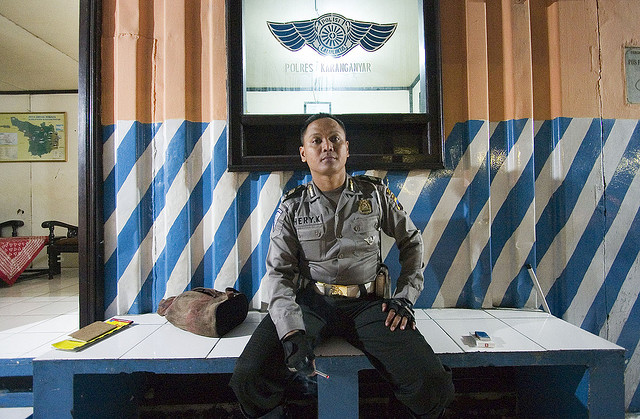
ASPI’s report earlier this year on the
police-to-police relationship between Australia and Indonesia is well timed; with Indonesia’s election cycle already underway, many will be evaluating the country’s governance—including the role of law enforcement agencies. The report reviews the role Australia plays in supporting and partnering with Indonesia’s main law enforcement body: the Indonesian National Police (POLRI). Among other conclusions, it notes the links between police cooperation and the broader bilateral framework of development assistance and political engagement. The report provides a good example of how POLRI’s achievements——such as the Bali bombing investigations—have strengthened its role and capacities vis-à-vis the armed forces, reinforcing a shift towards civilian leadership across the justice portfolio. That’s an important step towards democratising the rule of law. But PORLI still has some way to go.
Proud of progress since
reformasi, POLRI’s leaders are keen to continue improving doctrinally and operationally. Still, POLRI has limited influence over political and social issues affecting the broader justice system, or even its partner institutions like the judiciary. It’s not in POLRI’s mandate or expertise to re-design the system overall or its position within it. As with other organisations, it’s challenging for police forces to conceive and drive their own reform.
That big-picture point is important to shaping Australia’s approach to police cooperation. The report highlighted the practical outcomes of the bilateral policing relationship. But Australia’s police cooperation with Indonesia needs to sit as part of a broader program, and that means it’s likely to require resources and coordination from development assistance areas within DFAT. Police services typically shudder at the idea of a foreign affairs or aid bureaucracy directing their activities, but Australia needs to design, implement and monitor whole-of-government interests in a holistic manner. A flagship, cross-government budget for a program to support Indonesia’s progress on the rule of law would need a range of implementing modalities. Here are four:
First, Australia must ensure a component of funding goes to AFP to support flexible, low-key, small-scale—but crucial—training and liaison activities with POLRI. This is essentially an echo of the report’s recommendation to reinstate the Law Enforcement Cooperation Program, with the added suggestion to design, fund, report on and evaluate it within a clear strategic framework.
Second, wherever possible, both sides should seek to differentiate political discussions from practical police cooperation. Given the tensions of recent months, the report’s authors were rightly concerned about the impact of diplomatic issues in the broader bilateral relationship on the future of the police cooperation program. Indonesia’s recent choice of areas to target for non-cooperation is a handy guide for where it perceives relative benefits to be most in Australia’s favour. It would therefore be a good idea to design a program that explicitly includes areas for cooperation favoured by the Indonesians. For example, in the field of migration Australia prioritises police capacity to disrupt people smuggling, but Indonesia would be less likely to suspend such cooperation if the same program increased support for police capacity to investigate human trafficking cases, particularly involving harm to Indonesians overseas.
Third, it’s in POLRI’s best interest to consider the report’s suggestion for a wide-ranging police needs analysis, perhaps one conducted by the United Nations Office of Drugs and Crime (full disclosure: the author has worked for and with UNODC for almost a decade). An integrated approach from Australia—one that addresses policing as part of a rule of law system—would simultaneously demand attention to other justice institutions and issues. Yes, there’s a risk of ‘assessment fatigue’, given the number of such exercises Indonesia has supported in recent years (on policing alone the last year has included this kind of work by the Netherlands, International Organization for Migration and the US). Still, if there’s an opportunity to consider the future needs of the relationship, such a step would be important. Moreover, with a newish police chief and a political leadership set to change in the coming months, POLRI, politicians and other justice sector leaders may appreciate the benefits of the exercise. Even a process that simply brought recent assessments and research together collaboratively—with Indonesia chairing—would be a great start to a strategic program.
Finally, delegation to third parties of program management and monitoring can only go so far if the objective is to maintain rigour and maximise results. One strength of the AFP approach is that AFP officers are on the frontlines of the relationship. The same can’t be said for cooperation in areas such as capacity-building in the judicial system, where Australia’s activities are almost entirely outsourced. There can be good reasons to delegate technical work—accessing external expertise and reducing political pitfalls are two—but when the approach overall lacks coordinated ownership, guidance and engagement from both governments, it’s a recipe for inefficiency and drift. Replicating the AFP approach in other parts of a broader program would ensure a backbone of objectives and accountabilities run through it.
Jacob Townsend is a specialist in development assistance programs focused on migration and the rule of law. Image courtesy of Flickr user Jeff Werner. Print This Post
Print This Post